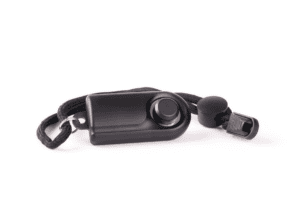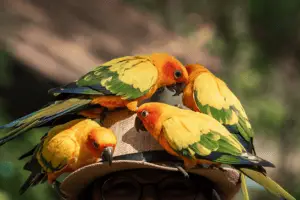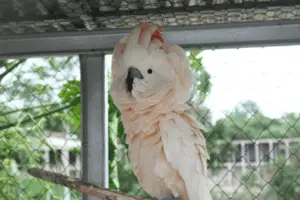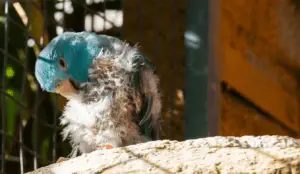Generally, Conures aren’t aggressive creatures; they’re very friendly birds that love spending time with their human family members. Unfortunately, these parrots can start biting everyone who comes near their cages or tries to touch them, which you can expect in some cases, especially during the mating season. But, there are times when they can start biting everyone around them for no known reason, which can be scary, especially for kids.
A conure can start biting everyone around them for several reasons. Still, the primary reasons include breeding season, playfulness, and dominance. Your parrot can also bite you when it’s sick, especially if it wants to be left alone.
Conures have an excruciating bite; if not controlled in time, this behavior can affect your relationship. So in this article, we’ll show you why Conures bite. We’ll also show you what to do and avoid when trying to stop the biting behavior.
Why Conures Bite?
Has your cheerful conure started biting everyone around it all of a sudden? Has it become aggressive towards everyone in the house, including other pets? After all, repeated use of their beaks isn’t a common defense mechanism among wild birds; they only use them for lunging displays. But in captivity, this behavior is considered a learned thing that they use to get the desired response. (source)
Despite being something that they’ve learned and worked for them at times, excessive biting can be very alarming. Luckily, there are reasons why conures in captivity behave like this, and the main ones include:
Reasons Why Conures Bite
1. Bird Behavior
As aforementioned, wild parrots don’t bite due to aggression; instead, they use their beaks for feeding or during the lunging displays. But when young, they can learn this behavior from other pets in the house and start using it to get what they want from you. (source) Therefore, just like other pets and kids, baby conures can also learn this behavior from the older ones.
After all, mature parrots bite each other when playing, and the young ones can learn this behavior and start biting other pets. This behavior can also be the outcome of aggression when you try to remove it from the cage. Instead of being gentle, you hold it tightly. The parrot may feel some pain and bite your hand, forcing you to leave it alone.
Biting can also be learned when you try to carry the bird. When presenting your hand, your pet will reach out and try grasping your hand with its beak and climb on.
But if you move your hand back quickly before it grabs correctly with your beak, you will be teaching it lousy behavior. You will be showing your parrot that it has to hold tightly and rapidly using its beak to carry out of the aviary. This behavior can quickly turn into biting.
Therefore having learned this behavior while young, they will always resort to it when they don’t get what they want or feel cornered. For example, if you move the bird to a place where they don’t want to go and don’t read all their body language, they will bite you. (source)
2. Fear Induced Biting
If your young parrot is afraid of people, forcing it to get out of its cage is equivalent to pushing it towards its predator. As a result of fear, it will become aggressive and attack anything or anyone that tries to get into the cage. (source)
If fear is why conures bite, you should show that you’re a friend who will always have their best interest at heart. You can be calmer when handling it, and don’t be too fast to pull your hand when it tries to bite or even bite you.
3. Medical Reasons
Like humans, conures also want to be left alone to rest when unwell. After all, they’re not in their usual jovial mood when sick. When sick, we lash out at anyone who tries to disturb us and lock ourselves in our rooms. But, conures will resort to biting anyone who comes near them.
Therefore, if your bird that loves playing and eats regularly stops doing that and starts biting anyone who comes near it, then you need to examine it. If you notice any sign of illness, you should contact the vet as soon as possible, and your pet will be back to its usual self in no time.
4. Dominance Behavior
All bird species, including the Conures living together, have a pecking order; therefore, they will do anything to protect their territory and status. It means that they will bite anyone they consider an intruder. Their territories will include other pets in the house and even their owner in captivity.
Some conures can even show dominant behaviors against their owners, and with time they will learn that they only have to bite you to get what they want. So they can bite just to see you yelling in pain or dancing around like the other birds in their territory.
To stop the dominance biting behavior, you should do the following:
- Clip some of the feathers on its wings to limit its flying abilities.
- You should never place it at the shoulder level; instead, you should go for mid-chest level.
- You should also never allow it to sit on your shoulders or head as it will encourage dominance behavior.
- Another reliable solution is always putting its perch and cage below your eye level. (source)
5. Breeding Behavior
The sexually mature conures are always in breeding mode during the mating season. Therefore, they can become aggressive and protective of their mates or when defending their nests as it belongs to them.
Mate-related aggression is quite typical among breeding birds. They can bite anyone who comes near their favorite person or cage mate. Mate-related aggression is common among sexually mature males, and it tends to worsen in the breeding season. (source)
For example, some conure species like the perch-fronted Conures are pair-bond creatures. They can be very territorial and possessive, especially when they experience hormonal surges during the mating season. Therefore, they may bite or even nip, and I’m sure you have seen lots of photos on Twitter of bird owners showing their bites, primarily when the beaks draw blood. (source)
Therefore, you should determine if the biting behavior signifies dominance or hormonal imbalance. If it’s a sign of authority, you should tame it using the above techniques, but if it’s hormonal, you shouldn’t worry too much about it.
6. Playing
Generally, any bird can occasionally bite when playing, and Conures are no exception. Conures tend to be over-excited when playing and can even bite you when excited. They can also inadvertently grasp onto a part of your body when they feel like they are losing their balance while playing.
Therefore, you should learn their body language and react when they show you a sign of discomfort. It could be as simple as moving the feathers on its wings or tail. When they have had enough and want to go back to their cage, they will show you, and if you don’t respond in time, they may bite you in anger. It will lead to a continuous biting habit that can even turn to aggression in the future.
7. Attracting Attention
Just like human beings, birds also react when they feel ignored. And if making noises doesn’t work, they can resort to biting. The conure will bite you just to get your attention or even bite their cage mates for attention. Therefore, you have to react as soon as you notice that it wants your attention.
How to Get Your Conure to Stop Biting

Like the perch-faced lovebirds, budgerigars, and cockatiels, the conures haven’t been bred in captivity for several generations. Therefore, they’re more wild than domestic, and they have only retained some of their wild behaviors like biting. (source)
I don’t want to make you fear your pet, but you need to be aware that these small creatures have a powerful bite for their size. They are not naturally dangerous, but being bitten by them isn’t pleasant. It can be excruciating, and it can even draw some blood at times.
Their painful bites have even forced some folks to handle their parrot less, which has affected how they relate with their birds. Therefore, you must learn how to eliminate or reduce this behavior.
What Not to Do When Dealing With a Biting Conure
1. Never Hit Your Parrot
You should never punish or hit your parrot when it bites you; you may destroy the trust and relationship, which is not worth it. If you need to let off some steam after being bitten by your pet, you can scream outside, go jogging, or punch your pillow.
Remember, they are smaller than you and never chose to be in captivity left alone in your home. Plus, being in captivity is punishment enough for some birds. Punishing them will increase their stress levels and fear while reducing their trust in you. It may even worsen the situation and promote aggressive behavior instead of reducing it. (source)
2. Timeout
Most parrot owners use timeout as a solution for biting, which is not ideal. Remember, it may be biting because it wants some time alone, so giving it a time out can reinforce this behavior. After all, parrots are not like dogs that crave your attention every time, and they may not connect the timeouts with bad behavior.
Timeouts are not efficient as a corrective measure. If you have an insensitive conure, then it may become even more insecure. It may promote a destructive cycle of stress and fear resulting in more biting and aggressive behaviors. (source)
3. Earthquakes
Earthquake refers to shaking the hand holding the biting parrot vigorously until it loses balance and flies away. Unfortunately, this may not necessarily result in the bird flying away; your pet may decide to bite and clamp its claws even harder while trying to regain its balance which can be pretty painful. (source)
What to Do When Eradicating the Biting Behavior?
1. Avoid the Situations That Force Your Parrot to Bite
If your parrot feels that it has to bite you to get a response, then this is not good for your relationship. For example, if it bites you every time you’re removing it from its cage, you should step back and find out what you’re doing wrong. You need to figure out how to remove it from its cage without getting bitten, which means more training.
If moving it from one spot to the other results in some aggression, you may need flight training to move it around the house instead of carrying it. (source)
2. Find Out What Happens Before and After Getting Bitten
What happens before and after being bitten matters a lot, primarily since your pet may be associating biting with something it wants. For example, do you put it in timeout after it has bitten you? If you do, it may associate getting some alone time with biting and will bite you every time you want to be alone.
It may be tired of playing and wants to relax or play. There are many things we do that can affect the behavior of our birds, and monitoring this can help us change this pattern and improve our relationships with our pets. (source)
3. Reward Good Behavior
Most of us tend to remember the aggressive conure that is screaming all over the house and forget about the cute pet that is playing and entertaining itself in its cage. So when you notice that your pet is doing good things, you should always reward it with praise and treats. But when it’s misbehaving, you should avoid giving it treats.
Doing this will help your bird associate treats with doing good things and prevent it from becoming aggressive or biting anyone in the future. It will show your bird that biting is not good behavior and that there are better ways to communicate. (source)
4. Hormonal Therapy
Suppose the cause of aggression is hormonal imbalance which usually occurs during the breeding season, and there is no mate around. In that case, hormonal therapy can come in handy. Hormonal treatment can prevent your pet from redirecting its aggression to other birds or biting you during the breeding season. (source)
Final Verdict
Have you ever tried handling a Conure with biting issues? There is nothing more disappointing than a beautiful conure that bites everyone who comes near it. Luckily, there are solutions for this problem caused by aggression, hormonal imbalance, and dominance. But first, you have to find out the cause of the problem before trying the above solutions.
- Teresa Bradley, Exotic Pet Behavior E-Book: Birds, Reptiles, and Small Mammals, Accessed May 03, 2022
- YouTube contributor, Why Birds Bite- Top 2 Reasons Parrots Bite Their Owners, Accessed May 03, 2022
- Margi Sirois, Elsevier’s Veterinary Assisting Textbook 1, Accessed May 03, 2022
- Brian Speer, Current Therapy in Avian Medicine and Surgery, Accessed May 03, 2022
- Elaine Radford, Help! My Peachfront Bites, Accessed May 03, 2022
- YouTube Contributor, 4 Ways to Stop Parrots From Biting, Accessed May 03, 2022
- Andrew Luescher, Manual of Parrot Behavior, Accessed May 03, 2022










